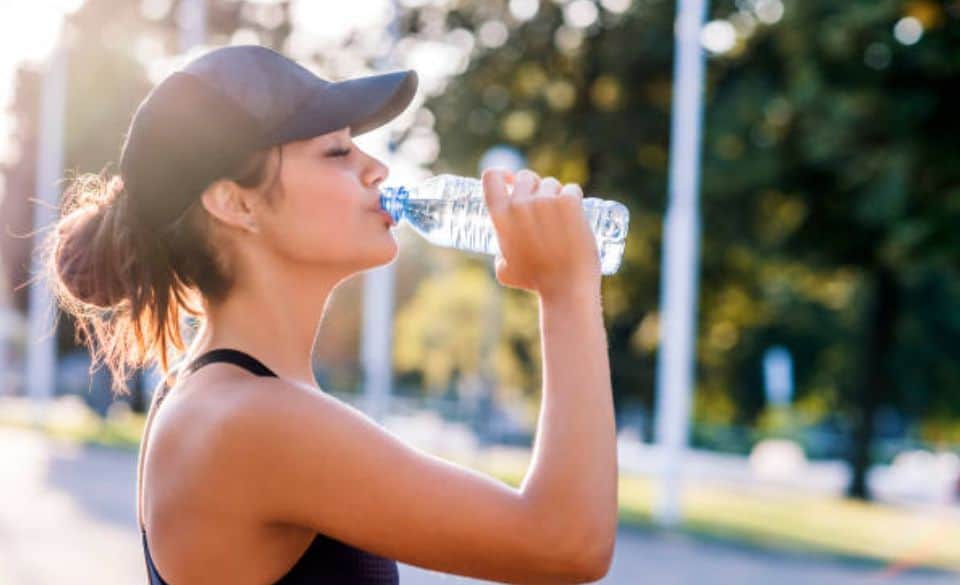
How to Prevent Dehydration During a Run
Page Contents
Have you ever felt dehydrated and dizzy while seeing your performance drop? Don’t worry you are one of the many runners that experience dehydration while running.
Dehydration while running can affect not only your performance but also your health. Because of this, it is important for all runners need to pay attention to their hydration, regardless of their fitness, age, or weight.
Below is a full guide to staying hydrated and some of the warning signs you may encounter when you don’t hydrate enough.
So if you want to know more about how to prevent dehydration during a run, keep reading.
What is Dehydration
Dehydration occurs when you lose more fluids than are being replaced, by sweating. When you lose more than two percent of your body weight in fluids, you are technically classed as dehydrated.
When you get dehydrated, your body doesn’t have enough water and fluids to perform its normal functions. This two percent of body weight lost in fluids can cause you to lose 4 to 6 percent of your running performance.
A study done by the American College of Sports Medicine reported that dehydration of two or more percent of your body weight will hinder mild and hot weather running performance. While higher levels of dehydration can substantially decrease performance even more.
Because of this, it is important to head into your race and work out well hydrated. It also means you will need to hydrate properly after training to reduce the chances of performance loss during your next workout.
Causes Of Dehydration
Dehydration can be caused by multiple things. These include:
– Sweating
– Substances like caffeine
– Lack of water in the bladder
– Respiratory losses
– Water Oxidation
– Poor hydration
– Heat
Combined, all these variables can lead to more serious dehydration. Especially over time when fluids aren’t replenished correctly.
Signs Of Dehydration
It is important to understand the early signs of dehydration and how to prevent it. Some of the most common signs of early dehydration setting in are:
– You become thirsty
– Your mouth becomes dry
– Feeling sluggish or lethargic
– Your eyes feel dry
If you don’t manage to hydrate after seeing any of the above signs, you may then experience more serious symptoms. These include:
– Muscular cramps
– Tired and heavy legs
– Headaches
– Nausea
– Fatigue
– Gi Distress
– Decrease in running performance
– Dark yellow coloured urine
If you decide to ignore these signs, you will drastically put yourself at risk, which can cause more serious symptoms like heat exhaustion, and heat stroke, resulting in hypovolemic shock.
If you think you are already drinking plenty of fluids throughout the day, you’re probably wrong. Research has shown that more than 75 percent of people in America are walking around dehydrated. So, if you are a runner, think again about how much fluid you are putting back into the body daily. As it may be less than ideal.
Why Is Hydration Important
Hydration is important because anytime you run or exert your body in another activity, you sweat. This then leads to a chain of reactions that cause the body to sweat, and if body fluids aren’t replaced quickly enough, your performance will start to drop. this not only happens to runners, but to all people doing sporting activities.
It also causes the body to:
– Reduce blood volume returning to the heart.
– Reduction in blood pumping to the heart
– Less oxygen-rich blood sent to the working muscles
– Your body will produce less energy
Even if you are not a runner, hydration is an important part of human function. If you fail to replenish lost fluid, it can reduce the chances of the body being protected against heat-related conditions.
How to Prevent Dehydration During a Run
Luckily there are ways to reduce the chances of preventing dehydration on a run. One of the best ways is to consistently drink enough water throughout the day. Not just before, during, or after your workout. This means having frequent glasses of water instead of taking large amounts of water or fluids in one go.
If you are a runner, it is important to plan your hydration around your runs as well as throughout the day. This means starting your runs well hydrated and drinking 16 to 20 ounces of fluid around two hours before your run, and another 8 ounces 20 minutes before you head out.
During your running workout
For most easy sessions lastly less than 45 minutes, you may not need to drink during the run. However, for more strenuous workouts, or longer runs it is important to take 4 to 6 ounces of water or electrolyte drink every 15 to 20 minutes.
If you are running longer than 90 minutes, we recommend having some sports drink than contains sodium and carbohydrate as this can help you stay hydrated and replace lost calories and electrolytes in the process.
After your running workout
Many people forget to hydrate directly after and in the hours post-workout. If you don’t hydrate enough after your session this can directly impact your recovery and next session training session.
to replace lost fluids after your run, try to drink at least 16 to 24 ounces of fluid for every pound of weight you have lost. This is extremely important during the summer months, so it is good to get into the rythm of weighing yourself before heading out for a run, so you can track fluids lost. this can also give you a rough idea of how much fluid you should be taking in during your workout.


